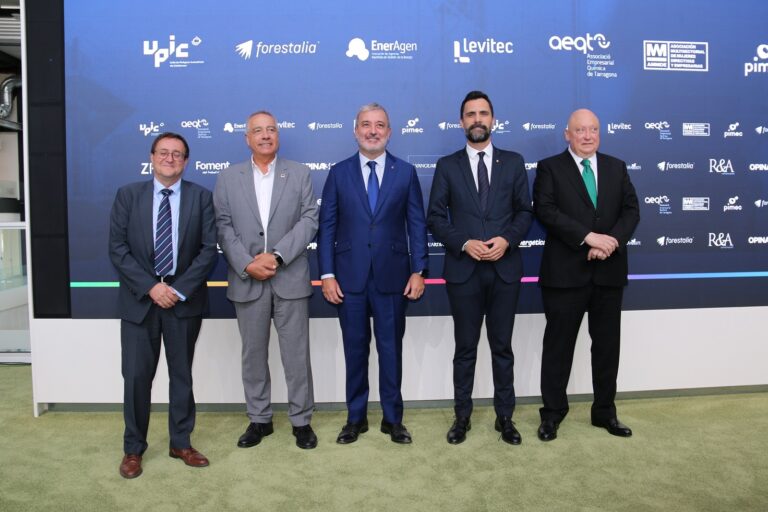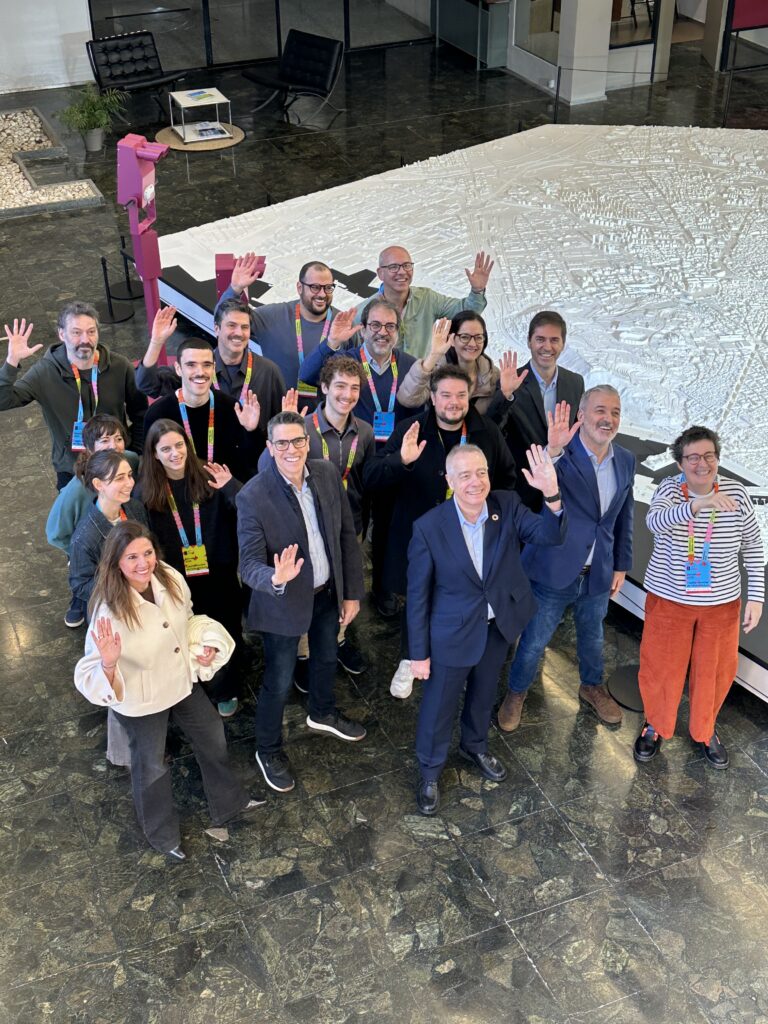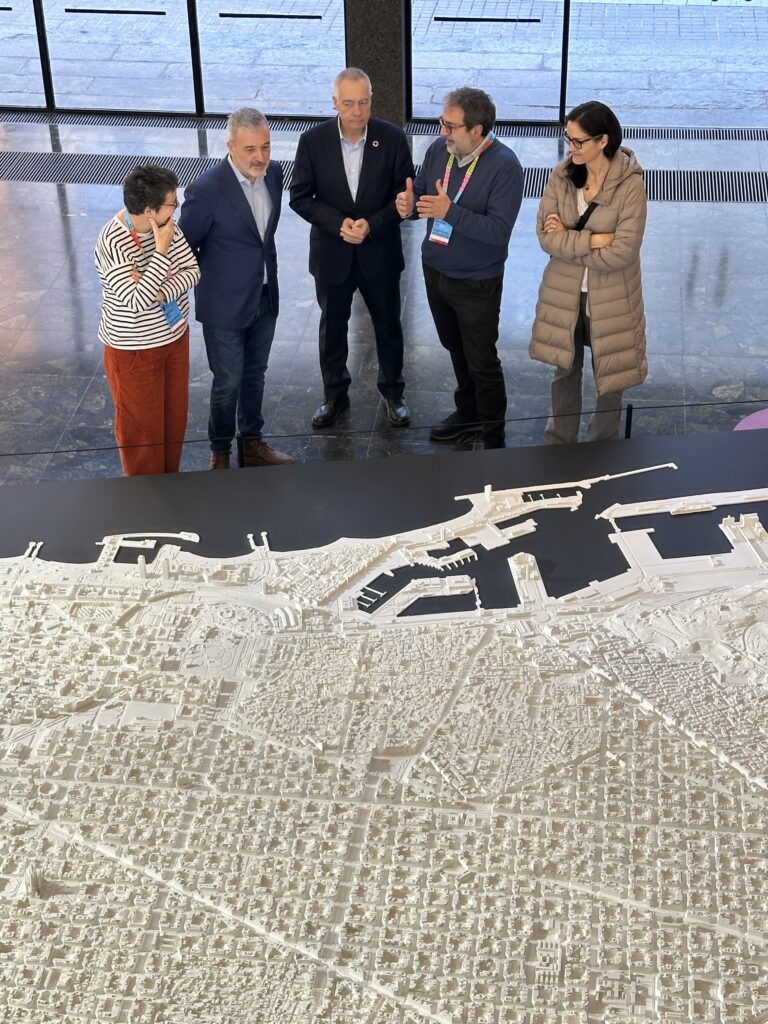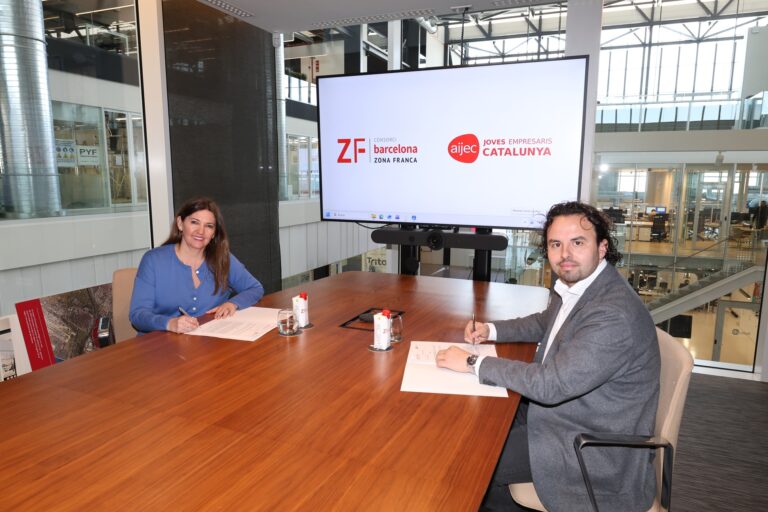Montilla and Mas advocate a “change of mentality” in favour of the industry in Catalonia

FIE2023
14 de September de 2023
They warn that without industries equipped with energy supply, we would enter a phase of “inevitable” decline
- Both former presidents of the Generalitat insist that the energy supply for companies must be guaranteed at a competitive price
- José Montilla recalls that it will be essential to replace the power of nuclear with renewable sources, such as wind and photovoltaic
- Roger Torrent underlines the commitment of the Generalitat to increase the weight of industry in the Catalan economy, accompanied by an increase in renewables
- Jaume Collboni declares Barcelona City Council “industry-friendly administration” and calls for an urban and clean industrial model
- Pere Navarro declares himself an “industrialist” for considering industry as “the basis of economic growth and wealth creation”
- Salvador Illa warns that in the implementation of clean energy “Spain is going well” but in Catalonia “there is still a long way to go”
Barcelona, 13 September 2023. The former presidents of the Generalitat of Catalonia José Montilla and Artur Mas advocated today for a “change of mentality” in Catalan society in favour of the industrial sector, because, otherwise, Catalonia will not be able to maintain the competitiveness of its industries and its entire economy will enter a phase of “inevitable decline”.
During their joint participation in a round table of the Industry and Energy Forum (FIE2023), held at DFactory Barcelona -the industry 4.0 ecosystem promoted by the Consortium of the Zona Franca of Barcelona-, both former leaders agreed that any industrial policy must have as its main objective to guarantee energy supply at a competitive price for companies. In this context, Montilla recalled that in the coming years, given the closure schedule of nuclear power plants, it will be essential to replace all the power of the reactors installed in Catalonia with energy from renewable sources, whose implementation is still insufficient.
In this regard, the also former Minister of Industry said that, for example, although the conditions of the Catalan territory for wind energy are not comparable to those of the Nordic countries, there are “opportunities” for development that “must be taken advantage of”. In the same way, he explained that in the case of photovoltaic energy, it would be enough, according to studies, to occupy 2.5 percent of the territory, which would safeguard all agricultural farmland and natural spaces. “It’s about having energy available, if it’s close better, at a competitive price for industries and for people,” he explained.
In this position, the vice president of Employment Promotion, Joan Roget, who acted as moderator of the round table, which was entitled “Industry and Energy in Catalonia: where we are and where we are going”. Roget highlighted the efforts made by the Catalan chemical industry to reduce the emission of greenhouse gases by almost half, while warning that the “key” today is energy from renewable sources because “without this guarantee there will be no industrial plants in the future”.
Artur Mas was explicit in stressing that although Catalonia has “all the assets and attributes to be an attractive destination” for investments and industrial projects, as evidenced by its centuries-old industrial “great tradition”, as well as its mentality, innovative capacity and position, it does not seem to possess the necessary “will”.
“I have the feeling that a basic condition to attract economic growth and dynamism is not just met, a country has to declare itself a friend of economic activity,” added Mas, who recalled that, during his time as president, he always defended a “business friendly” Catalonia. Regarding the implementation of renewables, Artur Mas indicated that “Catalonia has not done its homework as it should have been done”.
For his part, José Montilla added that to receive industrial investments it is necessary to “be competitive”, for which it must give a series of conditions, such as availability of capital, professional qualification, innovation and research, energy supply at affordable prices and also political stability, an “important” factor given that these are medium and long-term projects. Regarding the concrete supply of clean energy, he regretted that Catalonia is “in the tail” of Spain “along with the Valencian Community”-
Regarding the specific case of nuclear energy, Artur Mas defended maintaining its presence as “reserve energy in case the plans are not met, or we do not arrive on time” to achieve the renewable energy objectives. On the other hand, Montilla, who said he was not “anti-nuclear,” maintained that it does not seem “viable at this point to reverse the terms of closure of nuclear power plants.” “We have to play with our cards, we have sun and wind; We have to be able to have our destiny in our hands,” he added.
Apart from the nuclear case, the two former presidents fully agreed on the need for Catalonia to modify its sensitivity towards industry and the need for sufficient energy supply. “The changes in mentality are the most difficult, because the inertia weighs a lot,” said Mas, who warned that at present “speeches are imposed and decisions are imposed that instead of making us move forward either stagnate us or pull us back.” “We have to correct the course, rebalance the pendulum of the ideological gaze on the reality of the country,” he said.
At this point, Montilla stressed that “you have to do pedagogy, you have to say things not to please people; Sometimes you have to tell people what they don’t want to hear.” For the former president and former minister should not “make society believe that you can continue to live well without doing certain duties” because “companies as they come leave” and in such a case “decadence” will be “inevitable”.
Reindustrialize Catalonia
Prior to the round table, the special delegate of the State in the Consortium of the Zona Franca of Barcelona, Pere Navarro; the Minister of Enterprise and Employment of the Generalitat, Roger Torrent; and the mayor of Barcelona, Jaume Collboni, preceded by a welcome from the director of the FIE, Albert Concepción.
Pere Navarro declared himself an “industrialist” for conceiving industry as “the basis of economic growth and wealth creation”. Navarro claimed the role of the Free Trade Zone Consortium as a “spearhead” in innovation on new industrial and energy models, such as industry 4.0, of which the DFactory building itself is a clear example.
For his part, Collboni declared the Barcelona City Council as an “industry-friendly administration”. The councilor insisted that the Catalan capital wants to have more industry in its territory, “mainly in the Zona Franca”, but also in its “urban fabric”. In this regard, he advocated developing in Barcelona a new model of “clean and urban industry” whose ultimate goal is “to create quality jobs.”
In his turn, Minister Torrent explained that the Generalitat “is committed to reindustrialization” so that the “weight of industry” in the Catalan GDP is substantially increased, not only for its benefits in economic and innovation matters, but also in “social development” and “equal opportunities”, given that the industrial sector “drags the rest of the sectors to develop”. In this regard, he recalled the implementation from the Generalitat of the National Plan for Industry, in which “the energy vector is fundamental” within the framework of the “trilemma” composed of “supply, price and sustainability”. “The goal is to increase renewable energy as a general principle,” he added.
European objectives
The first session of the morning closed with a round table on the European strategy to achieve energy sovereignty after the pandemic and the war in Ukraine, in which the leader of the opposition in Catalonia, Salvador Illa; EU Energy Commissioner Ruud Kempener’s cabinet member; and the emeritus professor of the Faculty of Earth Sciences of the University of Barcelona Mariano Marzo, under the moderation of political analyst Daniel Bashandeh.
In his turn, Salvador Illa explained that it is essential to combine the fight against climate change with “the maintenance of an industrial base” for reasons not only geostrategic but also “to reduce inequality”, given that the industrial sector “distributes prosperity in a much more equitable way” in those places where it is implanted.
Regarding the objectives set by the European Union for the implementation of renewable energies, Illa said that “Spain is doing well” in its degree of compliance but, on the other hand, in Catalonia “there is still a long way to go”.
In his turn, Ruud Kempener explained that it is entering “the second phase of the European Green Deal”, in which the industry is conceived as a “solution provider” and during which the European Commission will launch a “massive package” of wind energy to supply the sector.
Professor Mariano Marzo was particularly critical of the European Union because today “in Europe there is no energy policy”, being “subsumed in what is known as ecological transition”, which in his opinion constitutes an “error”.
About the Industry and Energy Forum (FIE)
The Industry and Energy Forum (FIE) is a private non-profit organization that aims to contribute to increasing the competitiveness of the industry by providing a global technical and economic vision, with future projection and in which all the actors of the value chain of energy production and consumption in the industry are integrated.



